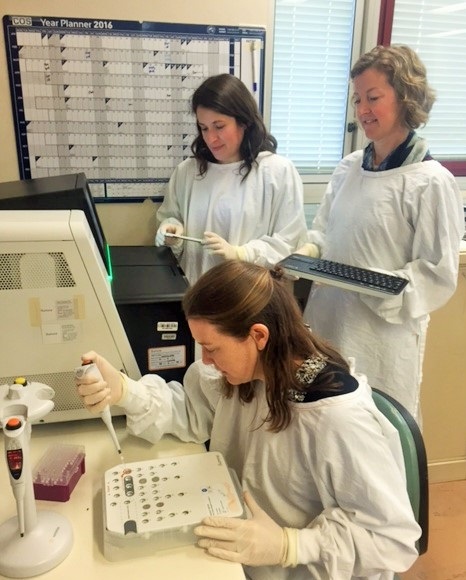Pathogen Genomic initiative
The NSW Public Health Genomics Partnership (NSW-PGP) is an exciting new initiative funded by NSW Health which recognises the importance of new genomic technologies to population health, and of a need for a networked centre of excellence for research and development.
The application of genomics to the study of pathogenic bacteria and viruses with epidemic potential and pathogens of critical relevance to hospital epidemiology not only offers new and important insights into their transmissibility and virulence but also can offer significant improvements in public health. Recent investment by NSW Health has enabled collaboration between translational researchers and clinicians and networking across different sites; providing a unique opportunity for implementation of genomic surveillance of pathogens into communicable disease control.

This Partnership is led by the Centre for Infectious Diseases and Microbiology – Public Health at Westmead Hospital and the Marie Bashir Institute for Infectious Diseases and Biosecurity at the University of Sydney and is hosted by the ICPMR-Pathology West. This rapid sequencing of disease-causing bacteria, viruses and fungi provides exciting opportunities for researchers seeking answers to questions in biopreparedness and high-burden infectious diseases.
The establishment of this NSW-PGP funding has already directly led to major competitive grant successes with NHMRC projects (some with collaborator investigators from the PGP) such as a $2.5 million CRE in Emerging Infectious Diseases ((CREID); CIA Sorrell; linking researchers and policy makers from four states and territories) aimed at protecting the public from emerging threats through the application of these genomic and new “digital epidemiology” technologies.
CREID investigators are also leading key components in a $5 million national CRE involving researchers and health officials from all states and territories, in infectious diseases emergency response research. This grant was awarded recently to improve Australia’s preparedness and ability to respond rapidly to emerging threats. The funding from NSW Health has resulted directly in highly-competitive research grant successes.
The team of clinicians and microbiologists at Westmead has secured several NHMRC project grants, some in collaboration with one or more PGP Network partners as CIs, in pathogen genomics. Our team has also been involved in the recently established Australian Partnership for Preparedness Research on Infectious Disease Emergencies (APPRISE), a national network of leading researchers who will deliver a coordinated and evidence-based response to infectious diseases which is based on another five-year $5 million NHMRC Centre for Research Excellence grant.
The main goal of this Partnership is to develop NSW capacity in public health pathogen genomics and to facilitate its translation into clinical practice. It has allowed clinicians and scientists in Sydney to become some of the leading groups nationally in genomic surveillance and disease control. Since its inception in mid-2015, we have sequenced and analysed genomes of more than 2200 pathogens recovered from patient and environmental samples in NSW, using next generation sequencing techniques and to date have engaged practitioners from Prince of Wales Hospital, Concord Repatriation Hospital, Prince Alfred Hospital, NSW Health Pathology and Sexual Health Services.
Our capacity to respond to new challenges in infectious diseases was successfully tested during the community outbreak of legionellosis in metropolitan Sydney in March/April 2016 when near real-time genome sequencing of bacteria, potentially implicated in the outbreak, provided critical evidence that helped NSW Health Protection to identify and rapidly contain the source of the infection.
ICPMRPathology West is home for several NSW public health reference laboratories which have embraced genomics as a tool for high resolution fingerprinting and the detection of drug resistance. For example, genomics will be invaluable for the elimination of tuberculosis in Australia as it enables better, faster and more targeted treatment of drug-resistant tuberculosis via genetic drug-resistance prediction. Furthermore, genome sequencing has been playing an increasingly important role in the investigation and management of foodborne outbreaks in New South Wales and in tracking antimicrobial resistance.
The NSW-PGP has been responsive to public health priorities in New South Wales and has strengthened the integration of reference laboratories into the public health responses of NSW Health Protection. The genome sequencing provided by the Westmead team has enabled more targeted and effective public health responses to several outbreaks of salmonellosis including the currently ongoing multi-jurisdictional outbreak of rockmelon-associated Salmonella Hvittingfoss. NSW Health leads the investigation of this national outbreak and the Partnership has been providing genome sequencing support for South Australia, Western Australia and Queensland in this investigation.
It is impossible to efficiently gather intelligence, investigate and respond to infectious disease outbreaks without reliable networks between public health professionals, microbiologists and academics. The establishment and development of the Partnership has encouraged such engagements and the sharing of genomic data for public health surveillance. Our Partnership will be a key contributor a Trans-Tasman Public Health Pathogen Genomics Network proposed recently by the Doherty Institute in Melbourne.
Further links with the world-leading pathogen genomics centres of Public Health England and the U.S. CDC are being developed to ensure that the capability established by the NSW PGP can be recognised, maintained and fostered. The Partnership has been rapidly growing due to the interest and participation of other groups and individual researchers and clinicians from NSW institutions. The inclusion of infectious disease genomics in the NSW Health Pathology Strategic Plan for Genomics reflects the emerging importance of genome sequencing for infectious disease management.
This article was provided by Associate Professor Vitali Sintchenko from the Sydney Medical School, Westmead.
Updated 7 years ago